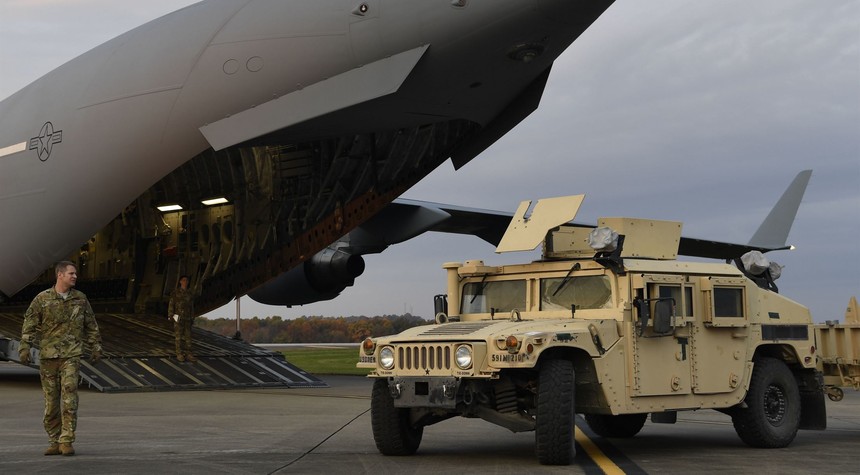
Government officials are investigating nearly $1 billion in land purchases near Travis Air Force Base in California due to concerns of possible foreign influence that led to an Air Force Foreign Investment Risk Review Office’s probe. If you’re already thinking Bill Gates or China, you’re likely not alone.
At the center of the probe is “Flannery Associates,” a “mysterious” investor group that has acquired nearly 52,000 acres of agricultural land in the state in the last five years to become the largest landowner in California’s Solano County, according to county officials and public records, as first reported by The Wall Street Journal on Friday.
After eight months of digging, officials have been unable to uncover the investors behind the deal.
An attorney representing Flannery insists the group is controlled by American citizens and that 97 percent of its investment capital comes from U.S. investors, with the remaining 3 percent coming from British and Irish investors. Flannery previously told Solano County the entity “is owned “by a group of families looking to diversify their portfolio from equities into real assets, including agricultural land in the western United States.”
“Any speculation that Flannery’s purchases are motivated by the proximity to Travis Air Force Base” is unfounded, the attorney for the firm told the WSJ.
Uh-huh— color me skeptical. For now, at least. Here’s more, via the WSJ:
The Air Force’s Foreign Investment Risk Review Office has been investigating Flannery’s purchases of roughly 52,000 acres, including around Travis Air Force Base, according to people familiar with the matter. But the office, which has been looking into the matter for about eight months, has yet to be able to determine who is backing the group, one of the people said.
California Democrat Rep. John Garamendi, the top Democrat on the House Armed Services Committee’s readiness panel, is also skeptical of the massive purchases near Travis.
We don’t know who Flannery is, and their extensive purchases do not make sense to anybody in the area. The fact that they’re buying land purposefully right up to the fence at Travis raises significant questions.
Solano County supervisor Mitch Mashburn said if Flannery intends to develop the land, it would make sense for the group to engage with local officials, but it has yet to do so.
The majority of the land they’re purchasing is dry farmland. I don’t see where that land can turn a profit to make it worth almost a billion dollars in investment.
Bingo. The base commander and other officers “are aware of the multiple land purchases near the base and are actively working internally and externally with other agencies,” a spokesperson told the WSJ.
Flannery has offered various explanations for its purchases over time. In 2019, Flannery attorney Richard Melnyk said in an email to a Solano County official that Flannery planned to work with local farmers and might explore “new types of crops or orchards,” he said, ruling out any cannabis operations.
In its May price-fixing lawsuit, Flannery said it planned to use the land for renewable energy and related projects. The entity has allowed many sellers to continue farming or remain on the land and collect income from wind turbine leases for the remainder of the lease, according to court filings.
Yet five years into the deal, zero crops, orchards, or windmills. Why?
Bill Gates, China
As I suggested at the top, it’s not unreasonable to consider China. As I reported in July 2021, nearly 30 million acres of U.S. farmland were owned by foreign countries as of May 28, 2019. Among those acres, Chinese owners controlled about 192,000 agricultural acres in the U.S., worth $1.9 billion, including land used for farming, ranching, and forestry, according to the Agriculture Department.
And according to Forbes, the number has since grown to roughly 384,000 acres. Of that, 195,000 acres, worth almost $2 billion when purchased, are owned by 85 Chinese investors— which could be individuals, companies, or the ChiCom government.
So why China has continued to acquire U.S. land at a record clip raises the musical question: Why in the hell is a communist dictatorship, whose stated goal is world domination, allowed to buy anything in the U.S., let alone massive parcels of farmland? While I can’t prove China is involved in this particular deal, it’s completely reasonable to investigate whether it is.
As for Bill Gates, who owned roughly 275,000 acres of farmland in the U.S. as of the end of 2022, according to the 2022 edition of the Land Report 100, the multibillionaire insists there’s nothing nefarious behind his ownership of the land:
I own less than 1/4000 of the farmland in the US. I have invested in these farms to make them more productive and create more jobs. There isn’t some grand scheme involved — in fact, all these decisions are made by a professional investment team
So why is it Gates’s full-time job? The co-founder of Microsoft wrote in 2021:
My investment group chose to do this. It is not connected to climate.
The agriculture sector is important. With more productive seeds we can avoid deforestation and help Africa deal with the climate difficulty they already face. It is unclear how cheap biofuels can be but if they are cheap it can solve the aviation and truck emissions.
Fine. But to borrow from the 1984 Wendy’s “Where’s the beef?” ad campaign, Where’s [sic ] the seeds?
Where are the biofuels? I’m far from a conspiracy loon, but questions like these, and larger questions about massive land purchases near sensitive government facilities, should not only be answered; they should also be disallowed.
Hell, maybe we’ll get a clue of who’s behind the Travis Air Base deal and why if a “harmless weather balloon” is suddenly launched from the “mysteriously purchased” land.
https://redstate.com/mike_miller/2023/07/09/mysterious-investors-buy-1-billion-in-land-near-key-us-air-base-officials-cant-figure-out-who-they-are-n773677

No comments:
Post a Comment